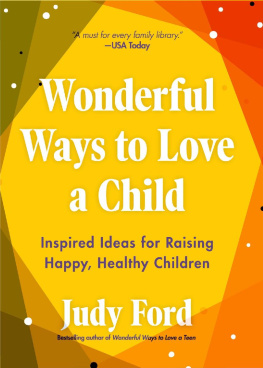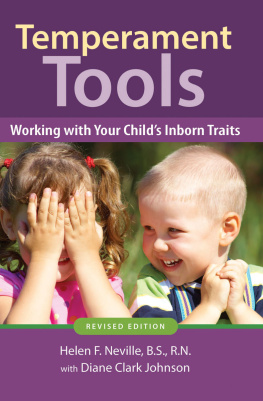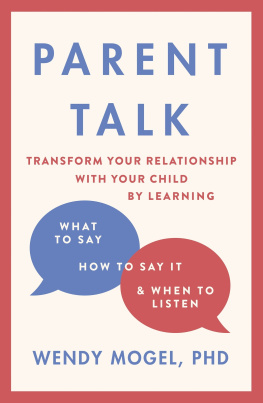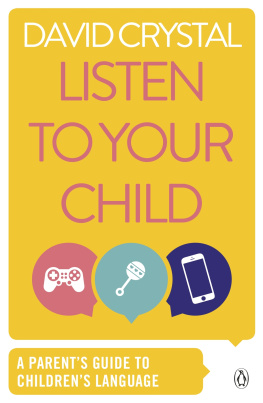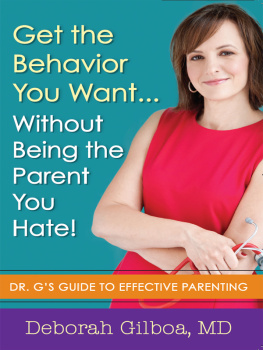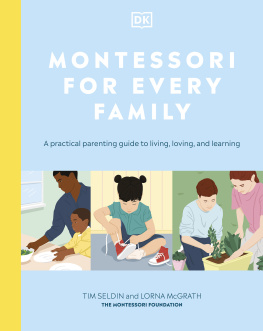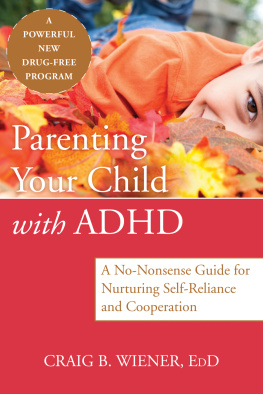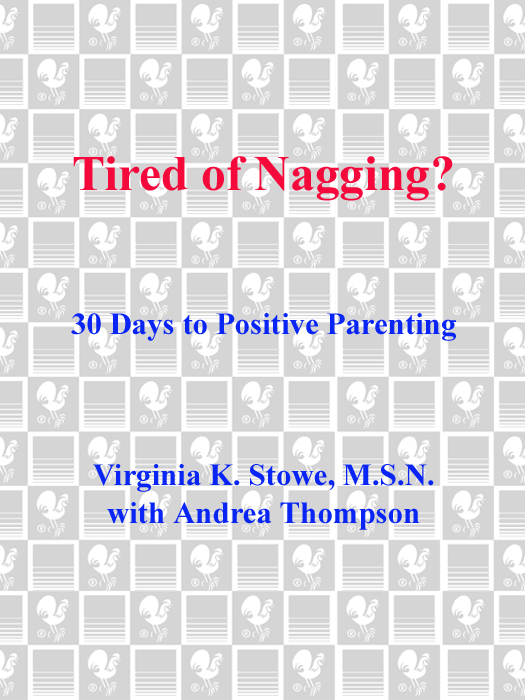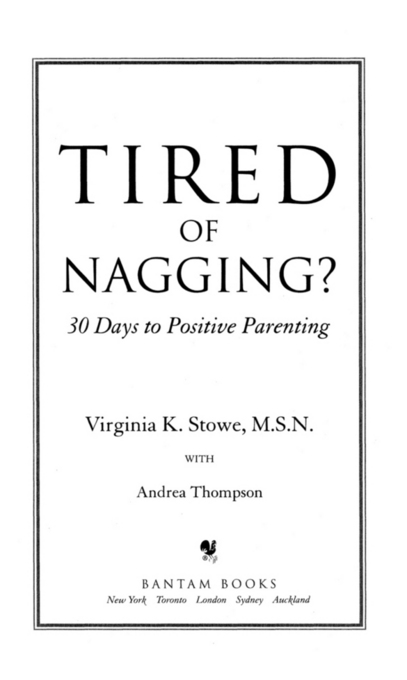DO YOU KNOW WHAT TO DO WHEN.
- Your toddler hits his baby sister?
- The preschool teacher tells you your daughter is biting other children?
- Your 4-year-old is taking longer and longer each night to get ready for bed?
- You call your son for dinner, but he ignores you and continues playing?
- During a walk in the park, your 2-year-old pulls loose from your hand and starts running away?
- Your 5-year-old calls you stupid?
These are the behaviors that test your patienceand your parenting skills. By using the 30 parenting tools provided by expert Virginia K. Stowe, youll feel confident when faced with the stressful situations that need effective actions and results. Youll also discover the all-day-long approach that helps a child grow with self-esteem, structure, and a firm idea of whats right and wrong. And best of all, instead of nagging, you and your child will have time for all the laughter and fun of these precious early years.
TIRED OF NAGGING?
The better way to become a great parent
TIRED OF NAGGING?
A Bantam Book / June 1998
All rights reserved.
Copyright 1998 by Virginia Stowe.
No part of this book may be reproduced or transmitted in any form or by any means, electronic or mechanical, recording, or by any information storage and retrieval system, without permission in writing from the publisher.
For information address: Bantam Books.
Library of Congress Cataloging-in-Publication Data
Stowe, Virginia K.
Tired of nagging?: 30 days to positive parenting / Virginia K. Stowe with Andrea Thompson,
p. cm.
eISBN: 978-0-307-76838-4
1. ParentingUnited States. 2. Achievement motivation in childrenUnited States. 3. Child psychologyUnited States. I. Thompson, Andrea. II. Title.
HQ755.8.S765 1998
649.1dc21
97-51246
Bantam Books are published by Bantam Books, a division of Bantam Doubleday Dell Publishing Group, Inc. Its trademark, consisting of the words Bantam Books and the portrayal of a rooster, is Registered in U.S. Patent and Trademark Office and in other countries. Marca Registrada. Bantam Books, 1540 Broadway, New York, New York 10036.
v3.1
Dedication
To the mothers and fathers Ive worked with who raise their children with commitment, reflection, humor and a truly inspiring willingness to keep growing and learning themselves.
To Douglas Brinton Stowe and Emily Augusta Thompson two great people who have given us more joy and added more depth to our lives than they would ever imagine.
Acknowledgments
First and foremost, my thanks to the many mothers and fathers who have taken part in my workshops and groups over the years. Im grateful for the opportunity to have worked with them and for all theyve helped me to under stand about the challenges, struggles, and satisfactions of todays parenting. Those parents stories and experiences, with names and other identifying characteristics changed for privacys sake, are the heart and soul of this book.
Ive been fortunate enough to know and learn from some wise and generous people, notably: Dr. Carol Hartman, my supervisor at the Intensive Nursing After-Care Project funded by the National Institute of Health under the auspices of Harvard Medical School at Massachusetts Mental Health Center, who led me through my earliest professional contacts with parents and children; Dr. Nina Lief, clinical director of the Early Childhood Development Center, New York Medical College, whose insights into how children grow and change during the first three years of life shaped my own ideas about effective parenting skills; Dr. Edwin Church, my friend and colleague, who helped this book come into being by always telling me I had something good and useful to say.
I am grateful to the University of Pennsylvania Graduate School of Nursing and Psychiatry where I studied, especially for its emphasis on normal child development and preventive mental health care, which is at the core of what I both practice and promote.
My great appreciation to Amy Berkower and Karen Solem of Writers House, who liked the book from the start and offered valuable suggestions on how best to present it, and to my editor, Beth de Guzman, whose enthusiasm has been most encouraging and indispensable.
Thanks to several fine friends: Barbara Wolf, Ronnie Jankoff and Mary Cohen, who supplied fabulous real-life examples of parent-child hassles and helped me settle on a title, and Lovejoy Duryea, who has been encouraging me for years to sit down and start writing.
A final thank you to my husband, Rick, not least of all for having tolerated a dining room table half covered with my papers and notes during the many months TIRED OF NAGGING? was coming to life.
Contents
Chapter 1
TIRED OF
NAGGING?:
An Introduction.
A 1-YEAR-OLD, who normally loves going out for a leisurely walk, suddenly wants nothing to do with getting in her stroller. Mom wrestles her child in, amidst screams, kicks, and arching back.
A 2-year-old refuses to take Dads hand as theyre walking to the park. Dad clamps on even tighter. As soon as he loosens his grip, off goes his toddler, gleefully running away while the frantic father charges after.
A 3-year-old has demanded SpaghettiOs and fish sticks for dinnerthen wont eat.
A 5-year-old thinks her parents are so stupid, and tells them so.
Does any of that sound familiar? Have you been there? Preschool-aged children are wonderful and trying little human beings! As we watch them grow from squirming newborns to young children heading off for the first day of kindergarten, they enchant and delight us. And just as often, they drive us nuts. Why is it so hard to get them to do the simple things they need to do? Why do we get caught up in so many struggles all day long? What more do they want from us anyway?
I know what you want, because it is what every parent wants: You want your child to behave in the ways that lead him steadily forward, toward his own life. You want him to learn to talk, dress himself, share his toys, play nicely with other children, use the toilet, not run into the street, accept what he has to do, challenge what seems wrong to him and, in time, do his homework, be responsible to himself and others, leave home, get a job, get married. You want him to become independent.
Heres what your child wants: All those same things! He wants to get on with his own life. He wants to be independent.
Since you and your youngster have the same goal, being a parent should be easy. As you know, however, its often not easy at all.
WHAT HE DOES THAT YOU CANT STAND;
WHAT YOU DO THAT YOU CANT STAND
Growing up to the age of 5 is heady business. Your youngster in those years is learning (besides the walking, talking, eating, toileting basics) that some things are safe and some are dangerous, that Mom and Dad are perfect and then that Mom and Dad arent so perfect, that other kids exist in the world and sometimes theyre fun and sometimes theyre hateful, that he doesnt know how to do a lot of things he wants to do, and on and on.
All this, at times, makes him angry, frustrated, scared, exhausted, impetuous, or in some other way bothered by his current lot in life. Those feelings often lead to whining, dawdling, hitting, the NOs, plain orneriness, and other (to you) unpleasant activities. But your child has to act in those ways. They are natural behaviors and they are not bad. They are what he uses to try to get what he wants or needs.


